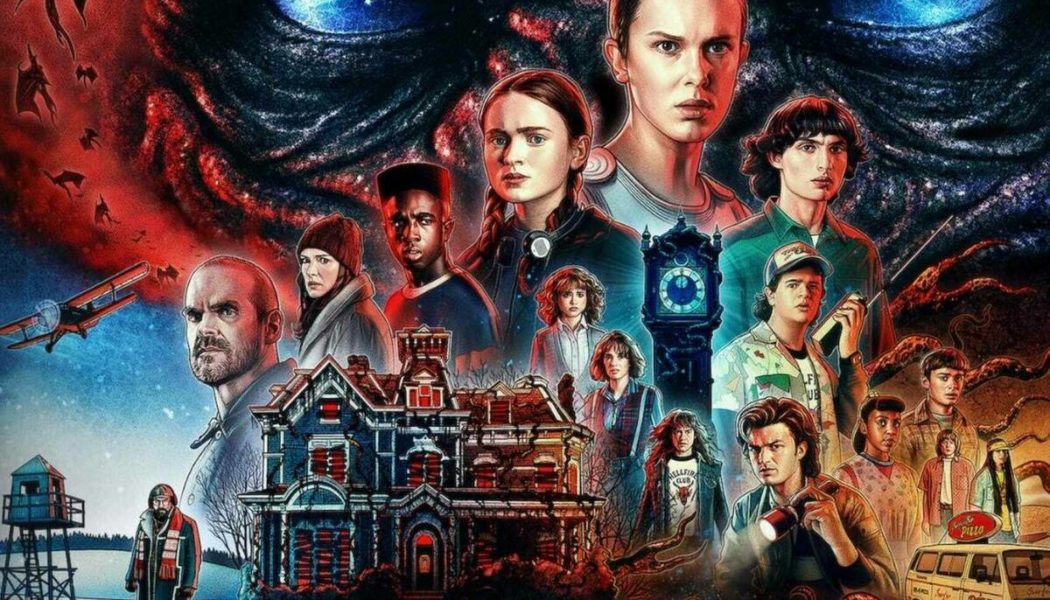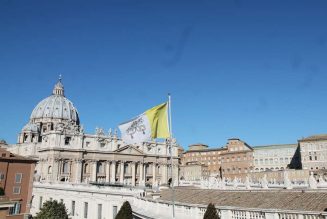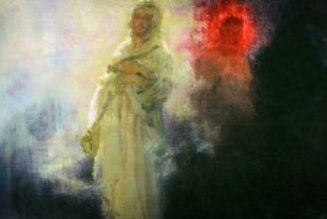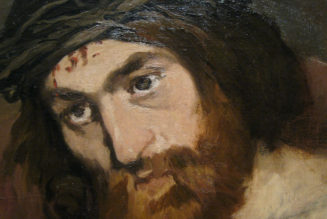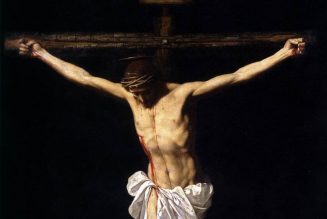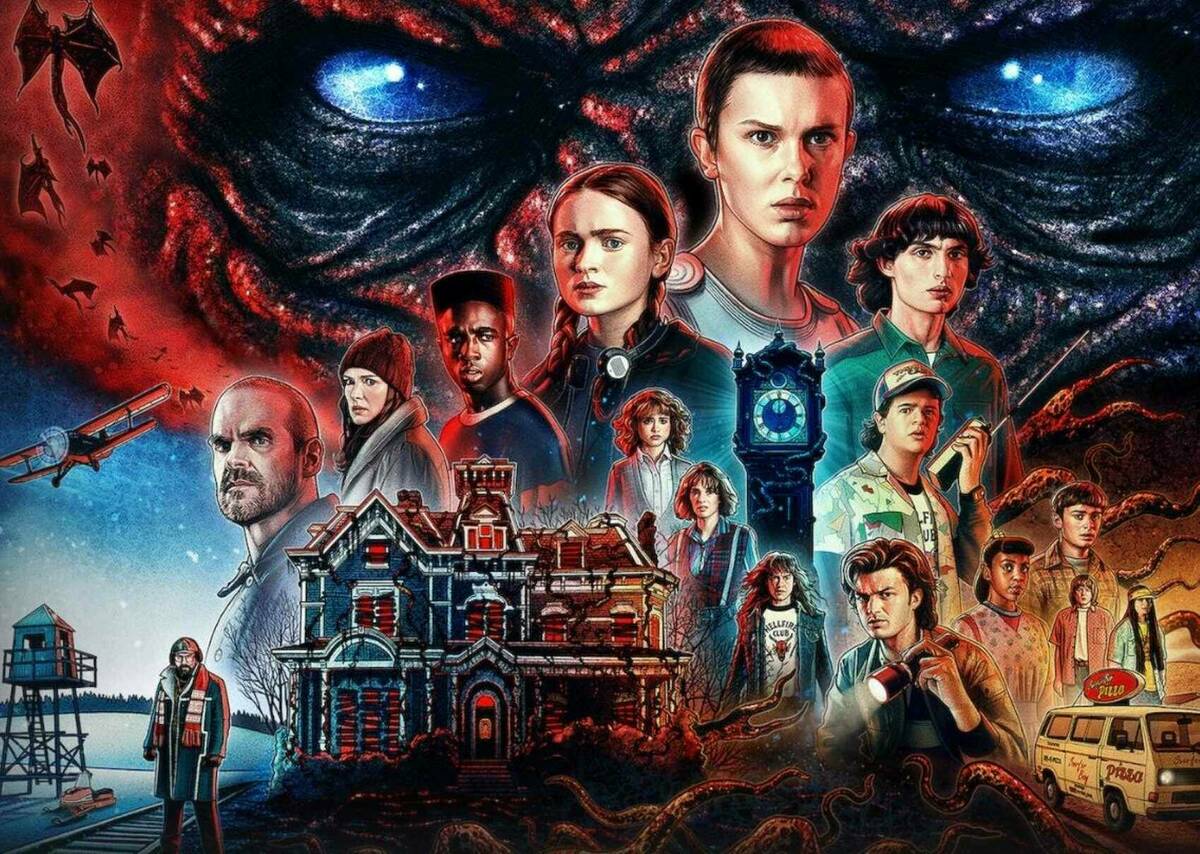
SPOILER ALERT: Spoilers ahead!
Since its debut in the summer of 2016, Netflix’s Stranger Things has been one of the most-watched programs on the streaming giant’s platform. Season 4, which was released in two volumes, racked up over 278 million hours of streaming in its first weekend of availability. The show, created by the Duffer Brothers, has maintained high levels of viewership each season, and has captivated a wide audience.
While I am personally not a connoisseur of all pop culture phenomena, I have been a fan of Stranger Things from the beginning. It is a wildly entertaining franchise with excellent writing, top-notch special effects, and a brilliant mixture of nostalgia and sci-fi. However, invoking a sort of Augustinian-inspired reading of the series, one can find a few logoi spermatikoi lurking just beneath the surface.
While there is no reason to presume that the Duffer Brothers are inspired by Catholic themes, as a fan of the show with a deep interest in Catholic theology, I posit two major themes that, when mined from a Catholic perspective, can help to explain why this show appeals to more than just young people: its profound cosmology, and its view of sacrificial love.
Catholic Cosmology and the Upside Down
The theologian Fr. Réginald Garrigou-Lagrange, in his famous work The Three Ages, noted that despite our many attempts to stay busy, to preoccupy ourselves with external conversations and distractions of all sorts, we all carry on within ourselves a great conversation with our Lord:
As soon as a man ceases to be outwardly occupied, to talk with his fellow men, as soon as he is alone, even in the noisy streets of a great city, he begins to carry on a conversation with himself . . . In a man’s hours of solitude, this intimate conversation begins again in spite of everything, as if to prove to him that it cannot stop. The center of the soul has an irresistible need which demands satisfaction. In reality, God alone can answer this need. . . . The soul must converse with someone other than itself. Why? Because it is not its own last end; because its end is the living God, and it cannot rest entirely except in Him.
Written nearly a century ago, Fr. Garrigou-Lagrange’s words still ring true, and they seem somewhat prophetic. Because human nature does not change, it is easy to understand how tempting it would have been, even in a pre-internet era, to find frivolous distractions to keep us from having to face our internal dialogue with God. What is less easy to understand is what Fr. Garrigou-Lagrange would have to say about the explosion of new distractions available to mankind in the twenty-first century.
Certainly, Netflix is among the greatest forms of distraction to which the modern soul can turn. Some hit shows and movies on the platform offer nothing but surface-level humor and mindless entertainment. But there is something different about the Duffer Brothers’ creation, Stranger Things. Even from the start, it has been apparent that the show gives us a sort of secular, or at least less-blatantly religious, lens with which to view what Garrigou-Lagrange calls our internal dialogue, or the “intimate conversation.”
In the first season of the show, Hawkins, Indiana is shown to be a neatly ordered, predictable, and family-friendly midwestern town. The tropes of 1980s suburbia are all on display: patriotism, consumerism, high school cliques, busy working parents, and carefree childhoods with no helicopter parenting. As the show progresses, we see there is much more going on in Hawkins than we see on the surface.
First, we learn that through a combination of psychedelic drugs, Cold War-inspired experiments, and a bizarre form of child abuse, a sort of alternate reality is brewing at the Hawkins National Laboratory on the outskirts of town. While viewers initially get the idea that the lab and its pseudo-scientific experiments constitute the deep mystery of Hawkins, this is only the beginning.
As we soon discover, there is a portal at the lab which has opened up a gateway to the Upside Down. This realm is a sort of hazy, mirrored version of Hawkins located underneath the town. It is dark, full of powerful evil ghosts or spirits of some sort, and it is growing and spreading under Hawkins like a virus. While the residents of the town are comfortable in their suburban bubble, keeping busy with lawn care and social activities, the course of events slowly reveal that the Upside Down is really unavoidable, and that it is only a matter of time before it breaks in upon the unassuming quietude of Hawkins. Even though it seems inevitable that the secret will be discovered, there are concerted efforts both to keep the existence of this realm a secret and to distract otherwise intelligent Hawkins residents from learning the truth.
This cosmology adds great depth to the show, and has a strong resonance with the Catholic vision of the world. Of course there is an obvious parallel to hell in the Upside Down, and it is hard to imagine the Duffer Brothers explaining this away as a mere coincidence. The Catholic cosmological vision is, to be sure, richer. We do not believe merely in the world and hell, we have hell, the world, purgatory, and heaven.
Still, even while Hawkins lacks an analogue for heaven, the fact that there is literally a whole other world, breaking in on the normal existence of Hawkins’s citizens, is a very powerful commentary on the true nature of reality. Which is to say, no matter how dutifully one attends to their obligations and responsibilities in the secular sphere, there is always more; there’s an entirely different order that we simply must pay attention to. And that is because this other world will impact us. It is not a question of if, but of when. This requires us to see the new world, to be aware of it, to pay attention to it.
And this is true just as much for the Upside Down as it is for us with respect to heaven and hell. In Hawkins, the truly wise are the children Mike, Lucas, Will, Dustin, and their supernaturally gifted friend, El. This crew expands throughout the course of the series, but in the beginning, it is this group of five children who alone see and understand the significance of the Upside Down. As the show goes on, they act as a sort of crew of apostles, spreading the unfortunate news of the reality of the evil lurking beneath Hawkins, along with a glimmer of the “good news,” that there is a way to at least survive, if not totally defeat it, thanks to El’s powers.
In stark contrast, the adults who are trying to keep the secret do not really understand the power of what is brewing beneath Hawkins. There are some beautiful spiritual parallels here. As the children intuit that whatever the Upside Down is, they cannot control it. They also cannot ignore it, but they have to, as it were, play by its rules. The foolish professionals who run Hawkins Lab think they can control and somehow utilize the Upside Down to their own benefit, and their hubris in the end destroys them. Our Lord may have had this in mind when he said that unless we become like a child, we will not enter the Kingdom of Heaven (Matt 18:3).
But not every adult in Hawkins is a foolhardy idiot bent on controlling and manipulating this dark underworld. Some are a bit more agnostic. The best example of this is police chief, Jim Hopper. It may not help my constant desire to imagine myself as a bona fide academic, but I have read a few of the fiction books that accompany the Stranger Things series. Because of this important research, I know that Jim Hopper has a very serious and profound backstory that is only given occasional lip service on screen.
He was a cop in New York City, he served in Vietnam, and has seen real, terrible violence. He was a hard worker before coming to Hawkins. He was even married with a daughter. He was, by all accounts, a man with a bright future ahead of him. But tragedy struck, and when we meet him in the first episode, we see the shell that remains. Hopper is sleeping around, drinking far too much, doing just enough police work not to get fired. In the first episode of Season 1, Chief Hopper is searching for Will Byers, wandering through the woods with a group of townspeople and he meets the local science teacher from Hawkins Middle School, Scott Clarke. They share a conversation that opens up this entire concept clearly and succinctly:
Mr. Clarke: Scott Clarke. I teach at Hawkins Middle, earth and biology.
Hopper: I always had a distaste for science.
Clarke: Well, maybe you had a bad teacher.
Hopper: Yeah, Mrs. Ratliff was a piece of work.
Clarke: Ratliff? You bet. She’s still kickin’ around, believe it or not.
Hopper: Oh, I believe it. Mummies never die, so they tell me. Sarah, my daughter . . . galaxies, the universe, what not . . . she always understood all that stuff. I always figured there was enough going on down here, I never needed to look elsewhere.
Clarke: What grade’s your daughter in? Maybe I’ll get her in my class.
Hopper: No she, uh . . . she lives with her mom in the city. Thanks for coming out, teach. We really appreciate it.
In the course of the next several seasons, the viewers see Hopper slowly move from that position of agnosticism with respect to what is going on around him. He is forced, against his will, and with great resistance, to admit that there is something deeper going on in the world. At first, it is that there is a world of darkness somehow spreading underneath Hawkins. It includes a dimension of the supernatural, and Hopper has to let his rationalistic biases submit to this element of mystery. He slowly begins to see that the world is not all simple rational calculations. Hopper’s retreat to Hawkins, away from New York City, was a flight from the problem of evil, from suffering, and he wanted to go somewhere where he could control his life, or at least avoid the suffering of innocent people. Surely a small town in Indiana would be free of this problem, right? Of course, that is not how things work, but we will return to Hopper later on.
In the Catholic cosmological realm, the saints show us the wisdom of not shutting out the wider view. Remarkably, even those religious saints like Mother Teresa or St. Damian of Molokai, who spent their lives literally serving the poorest among us, affirmed clearly that nothing we do in our daily existence will fill the void of attending to eternity. We cannot, in other words, distract ourselves, even with the corporal and spiritual works of mercy, in order to avoid that intimate conversation with God.
This is why, for instance, Mother Teresa’s day started always with adoration. She could not pursue the quite good works she was doing without relying on and returning to the grace of the God in whose name she would serve the poor. St. Katherine Drexel, who spent the first part of her life as a religious donating her family’s considerable fortune to build schools and hospitals for Black and Indian children, would later consider her prayer before the Eucharist the most important part of her ministry. As her health failed her, she could not be actively engaged in the external works of mercy, but she realized that this did not mean she was no longer useful. Rather she was able to do even more good through uniting herself in prayer with the Eucharistic Lord.
Heaven and hell press in on us, and eventually, we will have to face up to that. The wisdom of the saints is that they do focus energy on their quotidian concerns, but always in light of this larger cosmological reality. But another dimension of this is that the saints who focus so much on the wider reality that includes heaven and hell do not thereby forget or avoid the so-called “real” world. In fact, they engage with it more honestly and meaningfully. They find the true value of both their temporal existence and their eternal calling. Thomas à Kempis puts it this way:
By day they labored, and much of the night they spent in prayer; though while they labored, they were far from leaving off mental prayer. They spent all their time profitably. Every hour seemed short to spend with God; and even their necessary bodily refreshment was forgotten in the great sweetness of contemplation. (Book 1, Chapter 18, Imitation of Christ)
Jim Hopper Meets Benedict XVI: Love and Suffering
As I mentioned above, Hopper had seen some real tragedies in his life. But through the initial encounter of the mystery of the Upside Down Hopper begins, slowly but surely, to look again at the world. He is no longer content to keep his gaze fixed merely “down here.” That initial encounter with the mystery of the Upside Down leads to a far more profound reality that Hopper has to come to grips with over the course of the series: selfless love. Because he chooses to love Eleven, and he similarly chooses to love Joyce, Hopper’s life changes radically. He lets go of his desire to control everything around him, albeit not without some fighting.
He realizes the greater good of choosing to love, but it is not an easy adjustment to stop clinging to some of his wounded ideas about the way the world works. It’s almost as though he knows there is something better, but he is not sure what it looks like. He realizes he has to let go, but then does not know what he can in fact hold on to. This choice not only puts Hopper into a new wave of discernment and adjusting to the deeper meaning of life, it also brings him immense joy. He takes on the role of being a father to El, and struggles with how to balance love, protection, and freedom with the personal dignity El deserves. That transition is both hilarious and brutal to watch. In time, Hopper becomes much more the great man he wants to be and not the shell of a man we meet in the pilot episode. But with this decision to love, it means Hopper also is now open to suffering on a totally different scale.
In Seasons 3 and 4, we see Hopper willingly suffer, to an extreme degree, in order to save others. He seemingly offers his life for everyone at the end of Season 3. Then, in Season 4, Hopper endures excruciating torture in a Soviet prison camp. Whereas previously, the idea of suffering, especially innocent suffering, cast Hopper down into the depths of despair and agnosticism, by the time he suffers in the prison camp, it is as if he has been given a new light onto the mystery of suffering and evil. This is true in two ways.
First, he realizes that he himself has not been innocent all along. He has done wrong, committed sins, and violated people’s faith and trust in him. This means if he must suffer, he can hardly claim total innocence. Secondly, he has motivation to endure this suffering because it can, in the end, help him to save the world for El and for Joyce. He is not even sure whether he will get to see them again, but he risks everything just for the chance to protect them. The most significant development in his outlook is that he no longer flees suffering; he no longer seeks quick pleasure. Suffering, because of his capacity for love, had finally become intelligible, and in a mysterious way, even liberating.
Pope Benedict XVI speaks of the link between love and suffering in his 2005 encyclical Deus Caritas Est. One of the key ideas of that letter is that God’s love is expressed in its most radical fashion when it reaches the point of God wounding himself. Benedict notes that this is, of course, expressed most clearly in Christ’s Passion, where Christ not only suffers wounds, but gives himself up to death. However, in God’s relationship with Israel, he also suffered the indignity of idol worship. Benedict explains that this is not merely a theological type of error, but that in the eyes of God, and in the voice of the prophets, it is seen as a form of adultery. And yet even in the face of this reality, God is ready to forgive. As Benedict puts it:
God’s passionate love for his people—for humanity—is at the same time a forgiving love. It is so great that it turns God against himself, his love against his justice. Here Christians can see a dim prefigurement of the mystery of the Cross: so great is God’s love for man that by becoming man he follows him even into death, and so reconciles justice and love (§10).
Of course, for Benedict, God’s love, expressed in this radical form of willing to suffer on behalf of humanity, is not merely a theological abstraction. The context of his discussion of God’s love and what it looks like is animated by a desire for Christians to live out and embody this radical love in their own lives. The knowledge of God’s love is merely part of our preparation to go out and live this vision out. Further, we can only give the selfless love of God because we have first experienced and received that love from God.
Still, a knowledge and basic understanding of the love of God is helpful, as it allows us to clear away false or shallow concepts of love. While he rejects a simplistic duality between eros and agape, Benedict rightly notes that narrow and earthly forms of love, which do not prioritize selflessness, need to be put into the service of other-centered love. Thus he argues that “eros needs to be disciplined and purified if it is to provide not just fleeting pleasure, but a certain foretaste of the pinnacle of our existence, of that beatitude for which our whole being yearns” (§4).
This process of discipline and purification is precisely what Jim Hopper has gone through over the four seasons of Stranger Things. From his earlier agnosticism and self-centered lifestyle, Hopper has emerged precisely in and through suffering to a more realistic and also healthier view of the world. He knows the cosmos is more than what we immediately encounter, and he understands that the desire to avoid suffering, and control his life, ultimately are both unhelpful and destructive. Further, he demonstrates the close link between love and the ability to suffer meaningfully.
In another of Benedict’s encyclicals, Spe Salvi, he wrote about the idea of suffering well as a mark of a true society. Only when individuals and society as a whole can grasp the true nature of suffering, and its connection to love, only then can we truly say we live in a healthy society. Hopper’s initial flight from the problem of evil and suffering, his retreat as an attempt to avoid future suffering, ultimately was destructive. When he learned not to flee, but to embrace suffering, only then could he also learn to love, and to be at peace in the world.
Conclusion
There are doubtless those who watch Stranger Things and object to various aspects of it, such as its violence, language, etc. They may call it un-Christian or even dangerous to watch. Others will probably read this essay and find it merely papering over pop culture with a religious veneer. But I truly believe that in the contemporary context, where hundreds of millions of hours are spent engaging in media of this sort, if we as Catholics do not at least find ways to appreciate the points of contact with our faith that are latent within new media, we are losing a tremendous chance for evangelization. In another realm, that of science and religion, the church has long recognized that the model of conflict needs to be put aside.
John Haught, for instance, proposes alternative concepts: contrast, contact, and confirmation. I believe a similar approach to interpretation of new media such as Stranger Things, pursued along the lines of contrast, contact, and confirmation, is an important avenue for Catholics to attempt, as we continue to find new ardor, methods, and new expressions for evangelization in the modern world.
Join Our Telegram Group : Salvation & Prosperity
